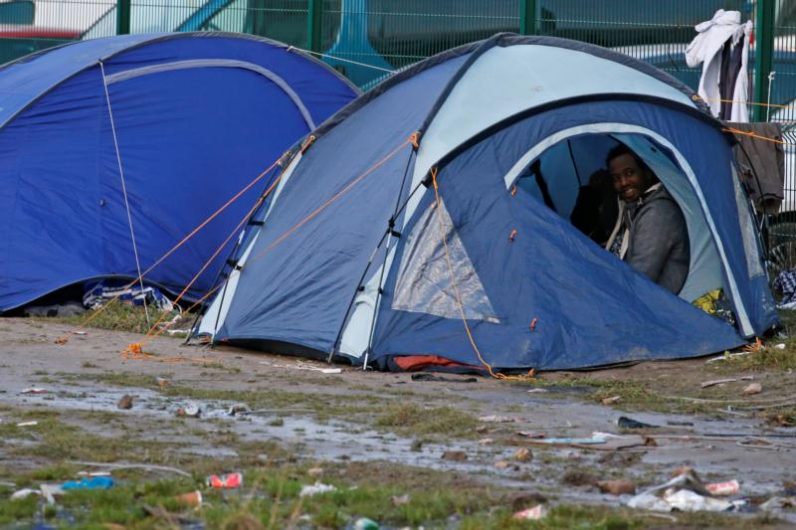
A migrant wakes up in a tent Feb. 2 in Calais, France. When the night falls, about 500 people sleep in the woods without tents or blankets in temperatures that go below 23°F. (CNS photo/Pascal Rossignol, Reuters)
CALAIS, France (CNS) — In the frosty winter of Calais, migrants and asylum seekers warm their hands at a campfire near the town’s main roads. Others roam the sidewalks, hoping to hop on the back of a truck to reach their last stop: the United Kingdom. But when the night falls, about 500 people sleep in the woods without tents or blankets in temperatures that go below 23°F. This is the last leg of a journey that started in Eritrea, Afghanistan or Iraq.
Migration is not a new phenomenon in Calais. Yet the sleepy French harbor has witnessed many changes in the past two years. Sixteen feet-high razor-wire fences circle its ferry port; riot-trained police dot its crossroads; and its infamous “Jungle” — a makeshift camp that held more than 10,000 asylum seekers — was dismantled in 2016. The Jungle’s inhabitants were placed in facilities throughout the country.
Today, migrants arrive at Calais’ “new jungle”: the forest.
“We have been sleeping and hiding in the woods,” David, a Jewish Afghan refugee, told Catholic News Service while sipping on tea at a day center run by Caritas, the church’s charitable aid agency. He, like other migrants, avoids sharing his last name for fear of reprisals. David and his younger brother, Jacob, go to the center every day to get some respite from the cold and charge their phones.
[hotblock]
“The police take away our sleeping bags every two days and arrest us, so we have to constantly be moving,” David said. Any settlements are broken up by a riot-trained French police body.
David and Jacob’s family fled Afghanistan during the 1979 Soviet invasion. Although they were born and raised in Iran, they could never receive Iranian nationality, so they had fewer rights than their classmates.
“There is a lot of discrimination toward us as refugees, like restricting our freedom to move in the country or choosing a job we like,” Jacob said. “In Iran, we also had to hide our religion and only practice it in our basement.”
Their dream is to fulfill their grandfather’s wish and study in the UK.
“We want to become professors and translators,” Jacob said with a grin. They both speak fluent English, French, Arab and Persian. “But for now, we escape the police, who detain us for weeks.”
Police and customs officials often intercept migrants in UK-bound trucks.
Accounts of police abuse abound in Calais and were picked up by Human Rights Watch. A migrant who wished to remain anonymous told CNS that police hit them “with metal rods in the joints and pepper spray them until they cry.”
“Things have changed in Calais,” said Dejen Haile Michael, an Eritrean refugee now working for Caritas. “People have become angrier; I’ve heard how some residents deliberately try to run over migrants or splash them with cold water when they drive.”
He said he believes politicians have helped instill fear in their constituents.
Michael fled a forced and lifelong military enrollment in Eritrea. He, too, hoped to reach the UK and had spent months at Calais’ old Jungle before applying for and receiving asylum in France. Many of his fellow Eritreans have had asylum refused throughout Europe and see the UK as their only chance for a new life.
“All I want is salaam (peace),” Yusuf, an Eritrean truck driver, told CNS around a small campfire. Yusuf delivered goods throughout East Africa until violence in the region barred him from working. He crossed Libya, the Mediterranean Sea, Italy and France and is now 25 miles away from his goal.
“I haven’t seen my wife and children in five years, but I try to speak to her every week,” he said, taking out his phone, which displayed a photo of his wife on the background.
As he spoke, one of his friends who had not slept in five days had an asthma attack, made worse by freezing temperatures. Members of the French branch of Caritas took him to a volunteer’s home to rest.
Humanitarian associations and their volunteers have been a lifeline to Calais’ migrants for more than two decades. Employees and volunteers work daily to feed, clothe and offer a few hours of rest.
“No one leaves their home and take so many risks for no reason,” said Michael, the Caritas employee.
“I never thought that I would one day leave my country,” he said. “We are looking for better lives, and I ask myself, what does the world have in store for us?”
PREVIOUS: Artists can help people discover beauty of God’s love, pope says
NEXT: Rome Colosseum bathed in red in honor of modern martyrs


Share this story